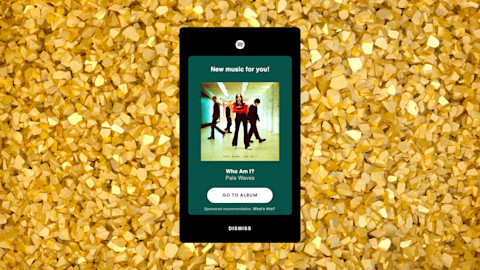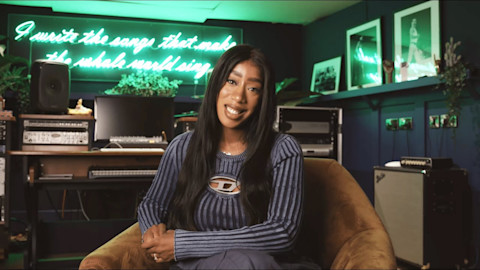Wayne Coyne is calling from his home office. It’s a small space, he says, with a comfy seat and a number of windows that let in natural light. It also happens to be his car, which is currently parked in his driveway. Coyne’s not going anywhere; he just likes to get behind the wheel for some peace and quiet. “We have a busy house with dogs and people,” the Flaming Lips frontman says, “so I come out here to do my interviews. I’ve got the air conditioner on, my phone is plugged into the charger… and it sounds pretty good in here!”
It’s a fitting scene for an artist who’s known as much for his shrewd resourcefulness as his music. Over their 35-year career, The Flaming Lips have transformed the most basic dollar-store items—Christmas lights, confetti, hand puppets, balloons—into rock’s most elaborate traveling freak show, one that serves as the retina-frying visual complement to the band’s seismic, surrealist psych pop. But while the Lips are gearing up the circus for another round of festival-headlining dates this summer, we’re about to get another reminder that these masters of feel-good spectacle started out as a bunch of misanthropic Butthole Surfers and Echo & the Bunnymen fans making a racket in their Oklahoma garage.
On the heels of April’s Scratching the Door collection—which packages the Lips’ 1984 debut EP with raw demos from the same period—Rhino will bring the rest of band’s ‘80s-era Restless Records catalog back to market in June via the six-disc box set Seeing the Unseeable, charting their initial baby steps from scuzz-rock misfits to noise-pop visionaries. And in the same month, we’ll see Greatest Hits Vol. 1, a best-of compilation and rarities collection that covers the Lips’ subsequent, ceaselessly fruitful tenure on Rhino’s parent company, Warner Bros., the major label they’ve improbably called home for over a quarter century now. The archival campaign is the culmination of a long-gestating plan to get the Lips’ entire discography under one label umbrella and to have their longtime producer, Dave Fridmann, remaster all of it. But, as Coyne tells us, it’s also a way for the band to reclaim some control of how their music is positioned and discovered in the streaming age.
Spotify for Artists: What was the impetus for all these reissues and compilations?
Wayne Coyne: Our manager, Scott Booker, had this ever-growing obsession with curating this version of our greatest hits and our early stuff. We like all the streaming services and their playlists [of our material], but I think those tend to be based on popular demand—like, the most popular song is the first song. And Scott liked this idea of: “Here’s a song that no one’s ever heard, but if people got to hear it, they would like it.” That’s the thing that doesn’t really happen with a playlist. He wanted to collect things that you simply could not get anywhere else. Some of these tracks have never been available.
Do you feel like the greatest-hits album is a bit of a lost art? It’s hard to think of a recent compilation that’s mythologized an artist to the extent that Hot Rocks did with the Stones, or Changesonebowie did with David Bowie.
For sure. Some of my favorite records are Donovan’s Greatest Hits or Elton John’s Greatest Hits—those are the records I know the best by them, even though they’ve got lots of great albums. And I’d say Tom Petty’s Greatest Hits is in that realm for me, too.
The greatest-hits record is an opportunity for the artist to take control of the narrative surrounding their music. For instance, Changesonebowie was Bowie’s first major compilation, but it didn’t include “Life on Mars,” which was a hit for him in the UK; instead, he included non-singles like “Suffragette City,” which became as popular as his singles.
That’s exactly right. And because of that, it took a long time before “Life on Mars” was properly celebrated here. We were covering that song right after David Bowie’s death, as a tribute, and people just went ape-shit for it, and we realized a lot of people felt the same way about this song, which was never a hit here, and he never really played it as if it was a hit. We’re of that same mindset [with our compilation]: It’s a hit if we think it’s a hit, even if it didn’t sell.
We were really happy to see the inclusion of “Zero to a Million” [an outtake from the band’s 1992 Warner debut, Hit to Death in the Future Head]. We had only ever encountered that song on a bootleg, on a cassette acquired over the internet in the mid-’90s.
That’s great. Back in the day, you had to do some diligent searching and you had to work at it. But to tell you the truth, I am glad when things are convenient—I like it when something is really great and really easy to get. That’s part of our goal with this compilation as well: You don’t need to spend very much time looking for it, it all sounds great, and it’s easy to access with the flick of whatever it is you’re flicking.
That song was part of the original demo that got you signed to Warner Bros. back in 1992. Legend has it you got their attention by essentially prank-calling the label—is that true?
Back then, it was very difficult to get the phone numbers of A&R agents at major labels, but a friend of ours would have some of them. And we would not prank call, but just call up Warner and say, “We’re The Flaming Lips and we want to talk to the person who signed Jane’s Addiction!” We ended up talking to quite a few people, and it was embarrassing, because we didn’t really know what to say, and we felt stupid about it. And then, coincidentally, about a week later, the actual woman who did sign Jane’s Addiction expressed interest in signing us. But it wasn’t because we made the phone call. We did think that was the case for about five or six years but, over time, we realized the intern who worked for her was a guy that we knew from San Francisco, who worked at a radio station. He was an absolute Flaming Lips fan, and it was his main goal in life to get The Flaming Lips signed to Warner Bros., and he drove her so crazy. And then once she saw us, we all fell in love with one another—and we never fell out.
![The Flaming Lips Photo by George Salisbury]()
The Flaming Lips Photo by George Salisbury
And that’s because, while you may not sell millions of records for them, you don’t lose any money for them, either.
That’s the truth. The money that we got signed for was an insane amount of money for us, but it wasn't very much to them, and it wasn't very much compared to the other acts that got signed around the same time we did and got dropped after. We were very sensible, and because we’ve been there so long now, we have a good sense of how things work and how budgets work. We know this group that are a couple of million dollars in debt, and they don’t realize it. They think a major label is supposed to buy them first-class tickets to Europe. And I’m like, “No, we don’t want that! We want the cheapest seat we can get, and we’ll pay for it.” We’ve never wanted a limousine. You can see where people get ridiculous wrong ideas.
Your band is celebrating your 35th-anniversary this year—a point where even the greatest, most resilient rock bands can seem like they’re creatively spent and just going through the motions. But it still feels like this band is experimenting and evolving and venturing into parts unknown.
There are groups that started around the same time we did, and we think, “They seem like a spent entity, their best stuff was 20 or 30 years ago now.” But maybe no one thinks that of themselves. Because we don’t. We think sometimes, “We’re doing our best shit right now!” We love The Soft Bulletin and Yoshimi, and we look at those records still in awe that we got to do them. But we never feel too intimidated and think, “What are we going to do now?” Because we’re always doing shit. We still love making records, and I think that’s probably the main difference between us and a lot of groups. A lot of groups are musicians who like to play. We like making records, which isn’t quite the same as playing music—making a record is more satisfying to us than just playing music. So we get involved with a lot of people, like Miley Cyrus. Suddenly, you’re in the realm of people making music right now, and it opens up new things to you after making music for 30 years. But it’s not about any desire to stay relevant. It’s just fun, cool shit to do.
— Stuart Berman







